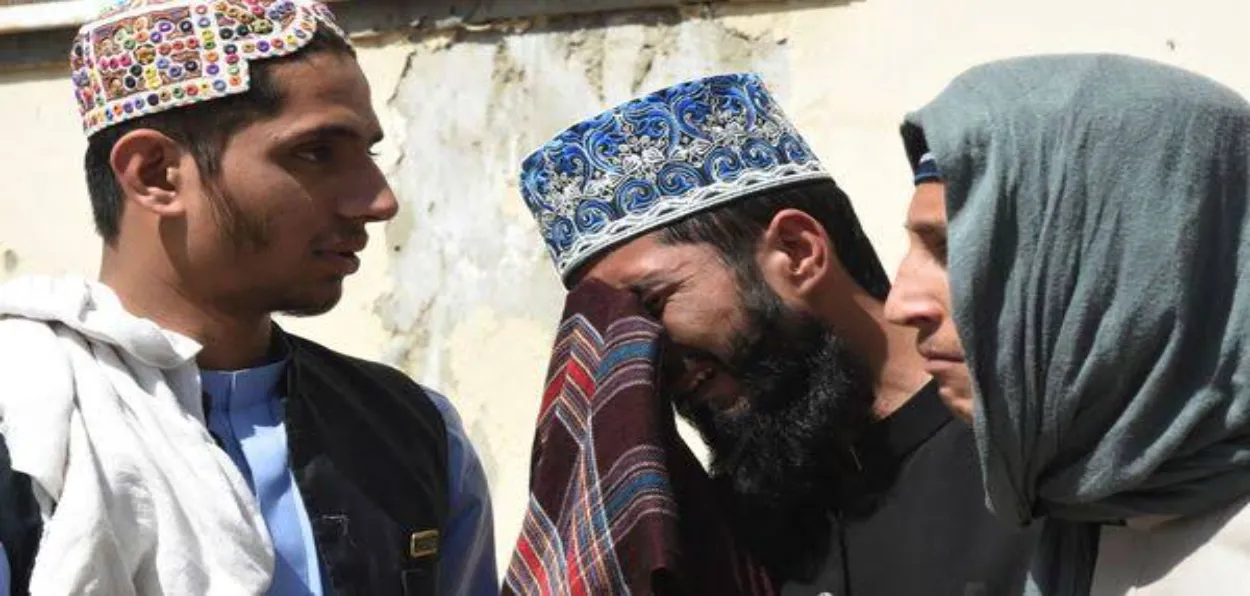In Pakistan, sectarian terrorism continues to take a terrible form.

The recent ghastly suicide bomb blasts in Pakistan on Friday on the Milad un Nabi Procession, and in a Mosque in the Balochistan area are not new. Regrettably, it has become a common occurrence for hardliners to target moderate and traditional Sufi Sunnis, Barelvis, and Shias on Azadari processions, with Sufi shrines and mosques subjected to terror attacks by extremist groups with radical Wahhabi-Salafi and Jamaat-e-Islami ideologies. These extremists oppose the celebration of events such as Eid Miladun Nabi, Azadari, and Urs ceremonies.
The root cause of radicalism and extremism is the politicization of religion by certain sects. It is extremely urgent to eliminate destructive hard-line ideologies and literature as Egypt did earlier, and Saudi is doing under the MBS leadership. Pakistan has to follow the cue and ban radical literature and extremist forces immediately which is taking several lives repeatedly.
It is about time moderate Sufi Sunni, Barelvis, and Shias unite and call for justice by advocating the prohibition of radical organizations and their propaganda. Similar measures, as previously undertaken by Egypt to combat the extremist ideology of the Muslim Brotherhood, are long overdue.
I am proud to be an Indian and hail our rich cultural diversity and faiths but am perturbed by the fringe elements inciting hate and divisions that resulted in a few lynching cases, and community clashes. In India, fortunately, we have never experienced anyone targeting religious gatherings and processions with bomb blasts as does happen in Pakistan. Triggering on politicization of Islam and extremism which is drastically radicalizing the youth is the militant literature produced by Wahabi/Salafi, Jamaat-e-Islami, and Muslim brotherhood founders and clerics.
The three extremist movements, Wahabism by Muhammad ibn ‘Abd al-Wahhab Najdi in Saudia Arabia; the Muslim Brotherhood by Hassan al-Banna and Sayyid Qutub of Egypt; and Jamat-e-Islami by Maulana Abul Ala Maududi from the Indian Subcontinent have sent turbulent waves over the globe with the development of extremist thoughts within the context of Islamic political and social ideologies. With the emergence of Wahhabism, The Muslim Brotherhood, and Jamaat-e-Islami, the world has stood on tenterhooks due to the three movement’s radically wrong interpretations of Islam in the 18th to 20th centuries. All three groups were power-hungry hardliners to inflict division and destruction to suit their ambitions.
Wahhabism
The rise of extremism in the form of Wahhabism can be traced back to mid 18th century with the teachings of Muhammad ibn ‘Abd al-Wahhab (1703–1792), an Islamic scholar who lived in Najd presently known as Riyadh in Saudi Arabia. His book Kitāb al-tawḥīd (Book of the Oneness of God) powerfully influenced Muslims. Wahhabism advocates a purification of Islam, rejecting the theology of four Islamic Jurisprudence of Sunnis and Jafria jurisprudence of Shias, traditional rituals, and philosophies of family members of prophets among the Muslims established by Sufis and Islamic scholars for over thousand years developed during the life of Prophet Muhammad and after his death because Islamic Caliphets remains only 30 years after the death of Prophet Mohammed, peace be upon him.

A child injured in the Mustang blast being treated in a hospital
From its inception, Wahhabism regarded traditional Muslims as kafir and mushrik (unbelievers or those make partner with God), leading to a justification for their acts of hate and violence against mainstream Sunni Muslims, Sufis, Shias, and non-Muslims worldwide.
With the discovery of oil, Wahhabism was strengthened to hold an official status in Saudi Arabia, receiving complete financial support from the Saudi government through the oil revenue. It wielded influence in countries like Qatar, Kuwait, and the United Arab Emirates, and has a significant following in Yemen. They also contributed mosques and madrasas in the Indian subcontinent at large in poor areas and prominent cities to flourish their school of thought which is called Salafism. It’s worth noting that while approximately eighty percent of American mosques exhibit Wahhabi influence, it does not mean other American Muslims support it.
Groups, such as Al-Qaeda and ISIS, have garnered global attention due to their acts of terrorism using the Salafist rhetoric to justify their actions and recruit followers and they often reject the authority of mainstream Islamic scholars and institutions.
The Muslim Brotherhood
The Muslim Brotherhood was birthed on 22 March 1928 in Ismailia, Egypt by Hassan al-Banna, an Egyptian schoolteacher and imam, along with six workers of the Suez Canal Company. It turned out to be the most influential Islamist organization in the world, mixing religious teaching with political activism and social welfare programs.
While Al-Banna himself did not explicitly endorse violence, he promoted the fanaticism and politicization of some members of the Muslim Brotherhood. His books such as Five Tracts of Ḥasan Al-Bannā, Concept of Allah In The Islamic Creed, and other books promoted Islamic activism. His vision of an Islamic state influenced later generations of Islamists who believed in using violence as a means to achieve their goals.
Deeply influenced by Hassan al-Banna, and a member of the Muslim Brotherhood Sayyid Qutub, an Egyptian author, Islamic scholar, revolutionary, poet, and a leading member of the Egyptian Muslim Brotherhood became prominent in the 1950s and 1960s.
Sayyid Qutub’s ideas have influenced numerous extremist groups, including Al-Qaeda which created Osama bin Laden, who was behind the 9/11 terrorist attack in the USA.
Qutub promoted the concept of violent and aggressive jihad. His book, Milestones stirred up the ideological inspiration for a series of violent Islamist organizations. He called for a profound transformation of Muslim societies by promoting a strict interpretation of Sharia law. He believed in armed jihad not only against oppressive rulers but also against those he considered to be in a state of jahiliyyah (ignorance) within Muslim-majority countries. He was hanged in 1966 after being convicted of plotting the assassination of Egyptian President Gamal Abdel Nasser.
Jamaat-e-Islami in the Indian Subcontinent
The Jamaat-e-Islami’s significant presence in Pakistan, India, and Bangladesh wrought trouble in the Indian Subcontinent fanning the flames of consistent bomb attacks and savagery. It was founded in Lahore, British India in 1941 by the Muslim theologian and socio-political philosopher, Abul Ala Maududi who aimed to establish a theodemocracy for enforcing “Allah’s sovereignty” on Earth.
Maududi’s books such as Al-Jihad fil Islam, and Maududi’s influence on Sayyid Qutb led to the endorsement of militant jihad against various systems, including communism and liberal democracy. He advocated violent means to establish Islamic rule, emphasizing strict Sharia law and rejecting secular governance. Maududi’s vision formed the basis for Jamaat-e-Islami, which later split into separate organizations in India, Pakistan, and Bangladesh. Related groups emerged in Kashmir, Britain, the USA, Australia, and Afghanistan maintaining international ties with Jamaat-e-Islami. The group’s affiliates in Kashmir have been linked to youth radicalization and violence.
Jamaat-e-Islami was banned in Bangladesh due to its involvement in genocide and other brutal activities.
Aligarh Muslim University and Hamdard University have recently banned the books of Sayyid Qutub and Maududi due to their extreme views against secular democracy, and teachings against the Indian constitution, particularly its secular laws.
In the current era, fostering development and harmony is essential. Ulemas in the Indian Subcontinent must work towards crafting a counter-narrative to eliminate extremist ideologies, ultimately contributing to a more peaceful and harmonious world. The Indian Muslim community should embrace Dr. A.P.J. Abdul Kalam’s philosophy of innovation, education, and technology to revolutionize India, Maulana Abul Kalam Azad’s political ideology for a united India, where people of different religions, languages, and cultures could coexist within a single nation and Sir Syed Ahmad Khan great vision of enhancing education, one of the architects of modern India who founded the Aligarh Muslim University.
Prince Mohammed Bin Salman Al Saud of Saudi Arabia’s initiative to denounce Salafism and promote moderation can be seen as a remarkable step towards reform. Saudia Arabia and UAE actively banned radical outfits like the Muslim Brotherhood, Jamaat e Islami, Tablighi Jamat, and its branches, after Egypt. They support women’s participation in the workforce, promote education, facilitate women’s right to drive, and ban The Muslim Brotherhood and its tributaries. They also perceive the Brotherhood’s populist appeal as a challenge to their absolute monarchies.
While Jamaat-e-Islami of India adopts a softer stance compared to its counterpart in Pakistan, Kashmir, and Bangladesh, they still adhere to the zealot teachings of Maududi. In India, there’s no concrete evidence to label Tablighi Jamaat as anti-national, but their traditional approach seems out of touch with the 21st century. Going door-to-door to encourage public prayers in places like trains, planes, and open spaces can inconvenience the general public.
In other Islamic nations, extremist outfits are prohibited. Tablighi Jamaat has been banned in Iran, Uzbekistan, Tajikistan Kazakhstan, Russia, and Saudi Arabia where its puritanical preaching is viewed as a danger to society. However, the Jamaat-e-Islami is still active in the Indian subcontinent continuing to produce radical literature.
In India, at this time, it is detrimental to share literature from Islamic teaching, from the authentic Hadith, with a scientific interpretation of the Holy Quran to produce literature promoting peace, compassion, and non-violence with emphasis on Islam’s values of dialogue, forgiveness, and peace to underscore compassion, tolerance, and peaceful coexistence as rooted in the Quran.

Injured in the Mustang suicide blast being taken to hospital
The Quran asserts the dignity of human beings regardless of their gender race or even status. It says: “We have bestowed dignity on the children of Adam; provided them with transport on land and sea; given them for sustenance things good and pure; and conferred on them special favors, above a great part of our creation”.
The Prophet of Islam said: “O people, be compassionate to others so that you may be granted compassion by God.” Nowhere in the Quran does it promote suicide bombing, riotous frenzied killings, or suppression of women. The term “Jihad” in Islam has been misinterpreted to generate fear worldwide. In its genuine meaning, Jihad represents the responsibility of all Muslims, both as individuals and as a community, to follow and fulfill God’s will.
The great Persian poet and humanitarian Sheikh Saadi Shirazi’s English translation has been scripted at the UNO Headquarters’ wall and can be read as “All human beings are limbs of the same body. God created them from the same essence. If one part of the body suffers pain, then the whole body is affected. If you are indifferent to this pain, with no feelings of sorrow, you cannot be called a human being.” said Shaikh Saadi, a great Persian poet and humanitarian. This is the heart of Islam.
The fanatical thinking in the Dal Khalsa Sikh organization set the scenes churning in violence over the decades. Today, the hot trending topic is the souring relations between Canada and India with the Sikhs for Justice (SFJ) in Canada provoking radical thinking similar to the mindset of al-Qaeda which exploded into 9/11. In a world where individuals from diverse religious, ethnic, cultural, and linguistic backgrounds migrate to different countries for education and employment, it is prudent for pluralistic nations to refrain from supporting the creation of new theocratic states. Such scenarios often result in intricate geopolitical challenges and multipolar divisions to break the peace and harmony of these nations.






